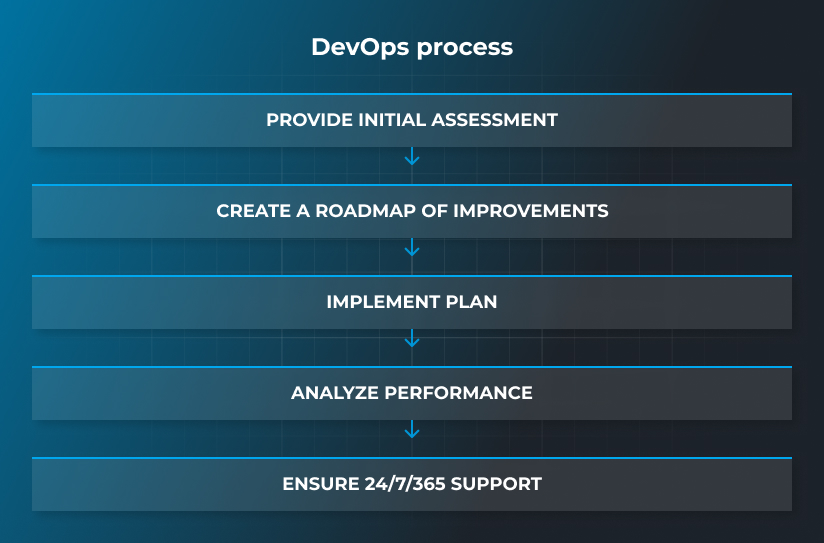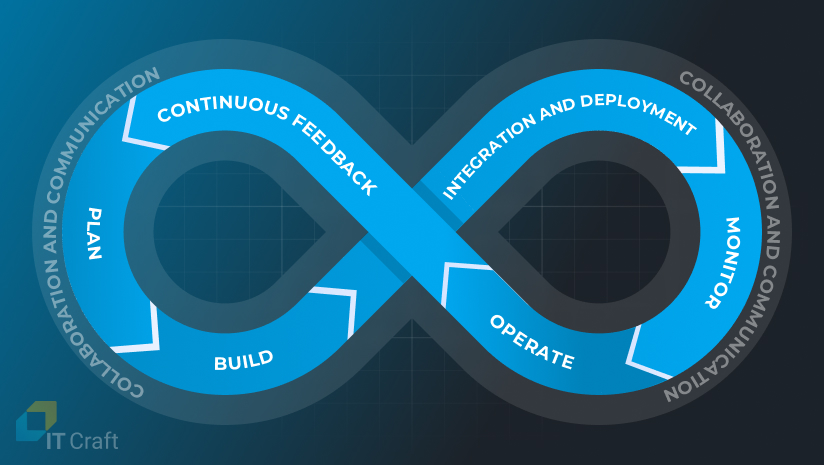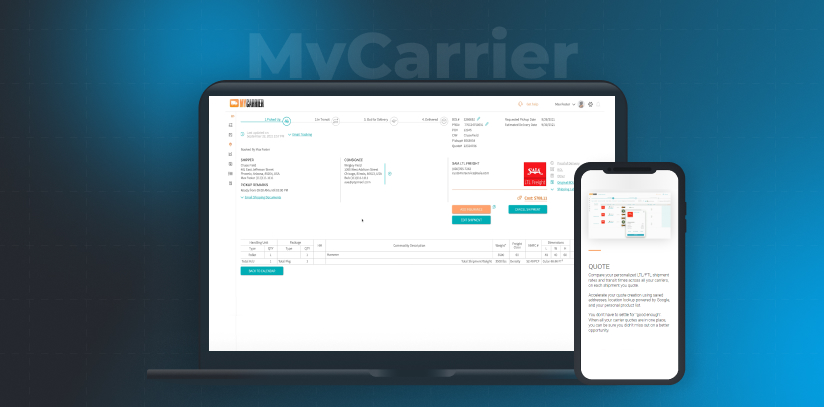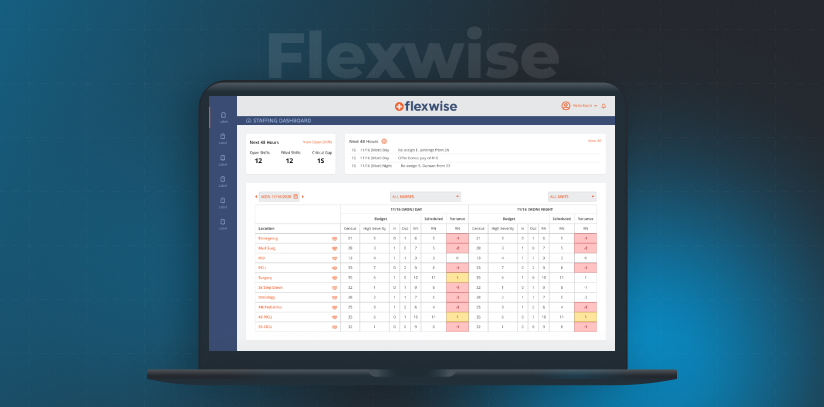Businesses facing digital growth challenges often set DevOps as their top priority.
Just a brief look at key statistics:
No surprise. DevOps engineers close the gap between changes in app source code and the app’s reliable maintenance. DevOps practices solve such challenges as:
- team productivity
- application quality
- software security
- time to market
All under a growing workload.
Still, 85% of all DevOps initiatives face barriers.
Often, businesses struggle to adopt DevOps for reasons other than technical constraints.
Why?
DevOps affects both DEVelopment and OPerationS processes. It makes the entire team accountable for reliable and scalable apps. And as the practice evolves, security becomes just as important—making it essential to follow best practices for implementing DevSecOps from the start.
Read about the benefits and challenges, best practices for process improvement, and what you need for DevOps adoption to be successful.
1
The Whys Behind DevOps Adoption
Short answer: industries adopt DevOps to handle the growing complexity of modern SaaS solutions.
Most businesses must amend their software strategy as online applications become complex. When apps offer a rich feature list and enhanced security, they contain many layers and dependencies, each affecting operations.
Your business requires DevOps adoption when your team:
- Runs thousands or millions of software copies simultaneously for a continuously growing user base.
- Provides immediate updates to software features and bug fixes, thus maintaining codebase stability and mending security vulnerabilities.
- Ensures 24/7 access for users across multiple time zones, even during software updates.
DevOps engineers support business needs for intensified software development by focusing on issues related to:
- decoupling large codebase into microservices
- app deployment
- infrastructure optimization
- alignment of development and maintenance processes
- automation of routine tasks
- and more
2
Benefits & Challenges of DevOps
The heart of DevOps culture is a united and shared identity between development, testing, and operations teams with shared common goals. It’s this alignment that drives a successful DevOps transformation and fosters a more collaborative, efficient workflow.
DevOps intensifies the pace at which the engineering team delivers updates.
-
Benefits
- More delivered features
- Improved Quality Assurance
- Frequent, stable software
- Optimized software development and maintenance costs
- “Zero-downtime” approach
-
Challenges
- Unique approach
- Transparency
- Feasibility
- Company's Culture
- Hiring DevOps engineers
The most significant benefits of DevOps adoption include:
More delivered features
DevOps culture boosts the entire development cycle by deployment automation. It eliminates idle time related to manual deployments. Developers have more time for coding and still manage multiple deployments per day. Expertise. Efficiency.
Improved Quality Assurance
DevOps engineers introduce test automation. Automating repetitive tests decreases time to market by removing delays previously governed by manual data upload and checks. There are fewer bugs at launch.
Frequent, stable software
New features neither break the existing code base nor slow down the app because of automating tests and deployment. The team quickly reverts back to the previous version if there seems to be a hiccup.
Optimized software development and maintenance costs
Optimization is one of DevOps’s key priorities. DevOps engineers do a wide-range analysis. Then they optimize infrastructure performance, configure and improve deployment and testing processes, automate jobs, and beyond.
“Zero-downtime” approach
DevOps engineers are risk management experts. They design a monitoring and alerts system that detects emergencies early, thus no major delays. They carefully prepare a disaster recovery plan to reduce downtimes and increase availability.
The benefits of DevOps sound lucrative. Why then do businesses get stuck halfway, failing to adopt DevOps?
Unique approach
There is no proven path to successful DevOps implementation. The range of optimizing app activities is broad and highly contextual. A comprehensive audit is always necessary to determine the best implementation roadmap and relevant technologies.
Transparency
Everyone involved in the software delivery process should be aware of all other parties involved. Teams must share the same goal and maintain a cooperative view of the software development process. Otherwise, they simply might not appreciate one another and start resisting the efforts of others.
Feasibility
DevOps might not be suitable for every project—adopting DevOps for heterogeneous environments is challenging. Legal or contractual restrictions might apply. Hence, any business must discuss all limitations upfront. The team needs to start with an audit to determine what practices they can safely use.
Company’s Culture
The unknown factor for success—or failure: people. The people factor has the most significant impact on a company’s ability to implement DevOps. If old traditions are too deeply rooted, DevOps might fall short. Hence, project participants might need to reevaluate their development habits and approaches. Training is required to help teams adjust to the new workflow.
Hiring DevOps engineers
Every organization requires an individual approach. DevOps expertise plays a vital role in the successful switch to the new workflow. Businesses need engineers who know how to solve growth challenges and optimize maintenance costs.
Need an expert’s unbiased look at your system?
Our DevOps engineers can do it in a comprehensive report.
Schedule a call
3
Adopt DevOps: Key Steps to Successful Implementation
So, you’ve decided to adopt DevOps for your project. Knowing how challenging implementation can be, always keep the following on your radar:
Determine goals
Articulate your challenges and business goals. Share them with the team to create a bigger picture. When unsure what criteria apply best to your system, ask for an audit as part of DevOps consulting services. The team analyzes system limitations and requirements. It then offers an improvement path.
Harmonize workflow
The introduction of DevOps often requires changes in workflows for greater efficiency. Make a thorough revision to eliminate any overlap of roles. Align responsibilities across departments.
It can be very challenging, especially for teams following specific guidelines or having fixed views on software development. Deliver a shared vision to ensure DevOps effectiveness.
Avoid dividing development, DevOps, and administration into separate workstations. Unite them into a harmonized process instead.
Go through all required work stages
The entire DevOps implementation process looks like this:

DevOps identify constraints, bottlenecks, and discrepancies. Then they offer a weighted plan. At the next step, they implement the plan, test, analyze, and work on further optimization.
Work in iterations
DevOps helps you in the same way Agile does: it grants your project more flexibility in changing requirements. It enables a shorter delivery timeline.
Engineers implement changes step by step. They analyze results and focus on further improvements, helping the entire team adapt to changes.

Use metrics
The best thing about DevOps is that engineers regularly measure multiple software parameters. They use metrics to monitor performance, remove emerging bottlenecks, and optimize the consumption of resources.
Metrics also make it possible to track project progress and, thus achieve high-level business goals.
Four key metrics include:
- Lead time for changes
- Change failure rate
- Deployment frequency
- Mean time to recovery
Decide on a tech stack
There are many tools and utilities, both open-source and proprietary. Each team must know how to use the selected tech stack properly. If they don’t they can damage software integrity and impact its security.
Check regularly to ensure the chosen tech stack remains relevant. The team updates technologies to the latest versions and works on tech debt.
Remember about security
DevOps helps the security team audit infrastructures, environments, and internal processes for vulnerabilities. No one is going to deploy a new piece of code without having it reviewed, tested for bugs, examined for security compliance, etc.
When everything is checked, DevOps ensures a quick patch to secure any breaches with a faster delivery time.
Keep technology lock in mind
Risks of becoming too dependent on a technology or vendor are unacceptable. Maintenance costs may even decrease ROI below break-even point in extreme cases. For instance, IT Craft architects design a migration plan to a well-known tech stack when they detect a technology lock ensuring reasonable maintenance costs.
Do you want to decrease delivery time yet increase quality?
Let’s discuss what is possible.
Contact us
4
IT Craft expertise
IT Craft team always focuses on the quality of delivered source code. DevOps is an integral part of IT Craft’s provided services.
MyCarrier
This project once started as a Web portal for the management of truckloads. It was initially launched as a monolith. The monolith covered all startup development needs.
The development team had to reconsider its strategy because of constant growth of the user base. It decided on software transformation. Developers divided the entire system into microservices. They transmitted those microservices into the cloud step by step, ensuring uninterrupted operations.
Team efforts resulted in increased stability, improved control over deployments, and more.

Flexwise
Flexwise platform contains comprehensive functionality needed to hire, manage, and supervise nursing professionals. Per the platform owner’s needs, the team had to finish the project and introduce multiple improvements, coping with the skyrocketing number of users.
The project team focused on breaking down the project codebase into microservices. It used dockerization and test automation to decrease deployment time. Component-based system architecture simplified updates and releases of new features.

!
Conclusion
DevOps delivers measurable results on a project. It helps businesses acquire new customers with improved quality. It also decreases manual labor through automation and fine-tuning development workflow. Partnering with experienced DevOps expert consulting company can help you unlock these benefits with confidence and efficiency.
DevOps adoption gives an upsurge in:
- speeding up software delivery
- reducing or even eliminating downtime
- increasing stability
- simplifying management processes
- improving infrastructure
One critical thing for successfully implementing the entire strategy is working with top DevOps talents. Make sure you get the best experts for the money you invest.








